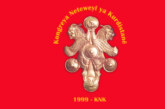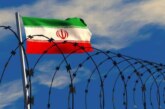
10th Kongra-Gel General Assembly / ANF
The Kongra-Gel (People’s Congress of Kurdistan) Council and Kurdistan Communities’ Union (KCK) Executive Council co-presidency released a statement declaring the final declaration of the KONGRA GEL 10th General Assembly Meeting held in the Medya (Guerrilla) Defence Zones. The meeting lasted four days and was attended by 160 Kurdish, Turkish, Arab, Persian and German delegates from the four parts of the Kurdish region and Europe.
After switching to the co-presidency/chair system at the 9th General Assembly Meeting, KONGRA GEL ensured equal gender representation in the elections, including on the Executive Council level, the statement said.
The statament by the Kongra-Gel Council and the KCK Executive Council Co-Presidency said that the 10th General Assembly Meeting highlighted concerns over the health and security of Kurdish leader Abdullah Öcalan, who has been subjected to aggravated isolation for 18 months; the coup attempt of 15 July and developments following this, the importance of Öcalan’s freedom to attain freedom for the peoples in Kurdistan, Turkey and the Middle East, and the urgency of his access to his family and lawyers.
”Öcalan’s ideas and projects for a solution to the crisis in the Middle East have become a path to freedom and democracy for all peoples in the region. Öcalan’s freedom and the freedom of the Middle East’s peoples is therefore intertwined. This is why the Kurdish people and the peoples of the Middle East and Turkey must struggle for Öcalan’s freedom and ensure the fraternity and freedom of peoples in the person of Öcalan,” the statement read.
The meeting also saluted the Kurdish people demonstrating for Öcalan’s health, security and freedom and underlined that their protests should be more effective and continue as part of the general struggle freedom.
It was also highlighted during the meeting that the century-old balances and system in the Middle East had collapsed on the 100th anniversary of the Sykes Picot Agreement and that old political balances and policies did not yield any results.
The meeting stressed that World War III was ongoing and that all international powers and regional states were partaking in this war directly or indirectly, while the peoples were enhancing their struggle to attain a free and democratic life.
”In this war which focuses on Kurdistan, Turkey, Syria and Iraq, the Kurdish Freedom Movement led by Leader Apo (Öcalan) is the only political party that has a resolution project for all the problems caused by this war. The democratic confederal system that Leader Apo bases on an organised democratic society separately from the statist system, and the democratic autonomous entities he anticipates on this basis are the only model for a resolution.”
Participants also stated that the struggle for a democratic confederal system needed to be expanded across Kurdistan and the Middle East as a hope for the liberation for humanity. The necessity of establishing a democratic alliance with the democratic, leftist and socialist factions, women’s and youth’s organisations, oppressed ethnic and faith groups across the entire region was also emphasised.
It was also stated that the ‘gordian knot’ in the Middle East would be disentangled by the struggle for freedom and democracy in Northern Kurdistan (SE Turkey) and Turkey, ”where the unity and joint struggle of democracy forces, revolutionary movements, women’s and youth’s organisations, democrat Muslims, Alevis and various Kurdish democratic national circles against the existing monist authoritarian system will determine the fate of the entire Middle East.”
”This alliance and joint struggle has become more important with the AKP government enlarging the nationalist front it formed after the 7 June elections especially after the failed coup attempt, which aims to crush all democracy forces and the Kurdish people. The General Assembly calls upon the Kurdish people and peoples of Turkey to wage a united struggle to stop the fascist AKP government that is formed on an anti-democratic and anti-Kurdish tendency,” said the statement.
The self-rule resistance in Turkey’s Kurdish region was also evaluated and praised for ”manifesting the Kurdish people’s insistence and will for democracy and a free existence,” during the meeting. Participants also saluted the resistance of guerrilla forces who supported the self-rule resistance.
The developments in Rojava and Syria were also discussed in the 4-day meeting. The Rojava Revolution – with the Kobanê resistance, Girê Sipî, Til Hemis, Hawl, Shaddadi and Tishreen operations and liberation of Manbij – being described as the revolution of the whole of Northern Syria. It was remarked that the Arab, Kurdish, Assyrian-Syriac, Turkmen, Armenian peoples, Muslim, Alevi, Christian, Êzîdî (Yazidi) and Druze communities had the opportunity to make Syria an example model for all the Middle East’s peoples if they came together.
The meeting also saluted the 12 HPG (PKK) guerrillas who ”mounted a historic resistance to hinder the Êzîdî (Yazidi) genocide in Shengal and also averted attacks on the Southern Kurdistan (KRG) and the Rojava Revolution.”
Participants also said that the self-rule and autonomy to be established in Shengal would also set an example for the democratisation in Southern Kurdistan and Iraq, and that defending self-rule in Shengal was a responsibility of all patriotic circles in Kurdistan, and the peoples of Southern Kurdistan and Iraq.
Regarding the political and social situation in Southern Kurdistan, it was stated that the main problem was the lack of a democratic mentality and the practice of democratisation. ”Policies formed by a democratic mindset and national interests will strengthen Southern Kurdistan in every regard and play a major role in the democratisation of Iraq and the Middle East,” the statement said.
With regards to the developments in Eastern (Iranian) Kurdistan and Iran, it was remarked that the people of Eastern Kurdistan could play a role in the democratisation of Iran and the entire Middle East by establishing closer relations with the democratic forces in Iran.
The General Meeting also highlighted the importance of Mosul’s liberation from Islamic State (IS/ISIS) occupation ”and the attainment of a democratic administration by Arab, Kurdish, Assyrian-Syriac, Turkmen and other ethnic and faith groups on the basis of the Democratic Nation perspective.” The importance of a joint fight by Shengal Êzîdî Freedom Forces, guerrillas, pershmergas, the Iraqi Army and popular Arab forces for the liberation of the Mosul city was emphasised.
Participants also highlighted the importance of Kurdish unity to attain recognition for Kurds in the 21st century and said it was imperative that a Kurdish National Congress convene to ensure this. The Congress called on all Kurdish circles to fulfill their responsibilities to realise the National Congress.
Kurdish youths were also called on to join the guerrilla and self-defence forces, mainly in Turkey’s Kurdish region and Rojava Kurdistan ”as an urgent and historic mission of patriotism.” Kurdish youths were also urged to not join the Turkish army to fight against Kurds.
The meeting also called on the Êzidî people and all other Kurds who were displaced by the war in Kurdistan and had migrated to Europe and other countries to return to their homes to make ”Kurdistan an ideal example for the Middle East.”
The statement invited international powers to act with responsibility for peace and stability, to abandon anti-Kurdish policies and play their role in unearthing a democratic Middle East.
The Kurdish people, all oppressed peoples and democratic forces in the Middle East were called on by the People’s Congress ”to strengthen unity in building an autonomous system to create a free and democratic future.”
KONGRA-GEL is the legislative assembly of the KCK.
Source: ANF



